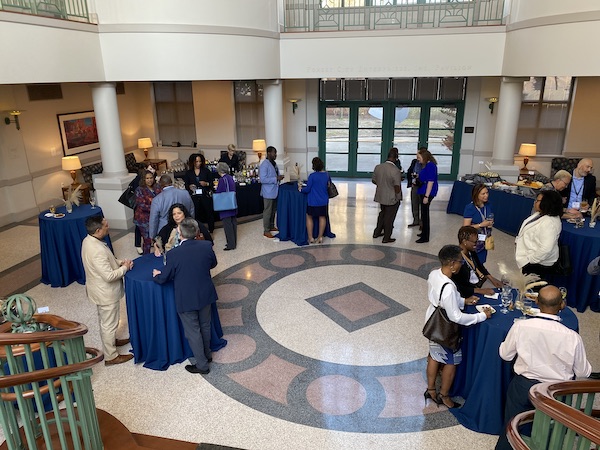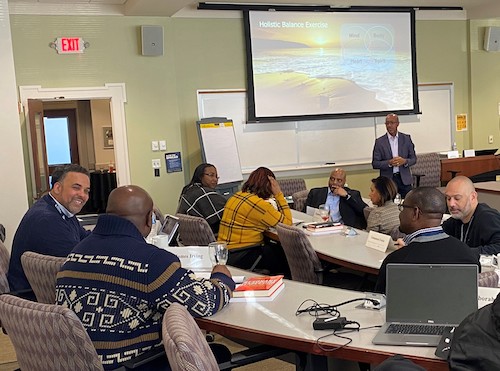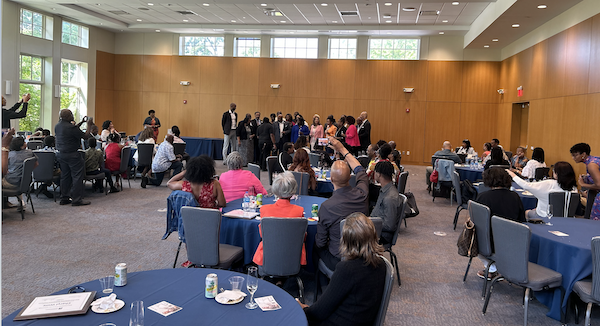
Thursday night social hour for first cohort of ELDE program participants at CWRU's Dively Center for Executive Education.
Probably one of the first desires any manager would ever express in the beginning of their career is a structure or rulebook on how to manage other people.
Indeed, it is often said that there is no rulebook on life, childrearing, marriage, or managing.
However, for decades in management, there have been an avalanche of how-to books on directing others. And, there have been highly-developed programs designed for management to help bolster their leadership potential.
For African Americans who aspire to move through the management ranks of medium- and large-scale American companies, the path to finding the ideal mix of organizational, moral, and financial support to enroll in traditional corporate leadership training programs has long been a significant challenge.
“In 20 years doing this, no matter what the program, I can always count on one hand the number of managers of color with the opportunity to be in these programs,” explained Melvin L. Smith, Ph.D. professor of Organizational Behavior, at Case Western Reserve University’s Weatherhead School of Business.
Smith coordinates Weatherhead’s Executive Leadership Development Experience (ELDE) program. The main goal of ELDE is to further develop the capabilities of middle management executives, especially black professionals, and “provide pathways for them to further their careers.”
“For a region with the level of (ethnic and racial) diversity that we have, why are there so few members of our community in the management ranks?”
The program is cohort-based, with an average of 20 to 30 individuals completing the five-month program together. ELDE recently graduated its first cohort of executives, some of whom work at nationally recognized, Cleveland-based corporations – including Eaton Corp., The J.M. Smucker Company (“Smuckers”), and Progressive Insurance.
The program targets professionals, especially those who are African American, with at least 10 years of professional work experience and at least five years of management experience, who are interested in advancing to the senior levels of their organizations.
Prospective program participants are also expected to be willing to contribute to building a pipeline of leadership, by committing to developing other black executives who are one or two levels below them.
The program features once-a-month sessions, which usually last from Thursday evenings through Saturday morning. The sessions kick off with a Thursday evening reception and a speaker/panel event. Sessions continue with a full-day content conference on Friday, which includes two or three modules focusing on specific dynamics of leadership. The monthly sessions are capped off with half-day, Saturday morning content sessions.

ELDE cohort members in class session with Professor Melvin L. Smith, standing.
Among the modules highlighted in the program are: resonance and emotional intelligence, mastering self-performance and life results, understanding adaptive leadership, probing the concept of inclusive excellence, as well as defining strategic planning and leadership.
ELDE also includes one-on-one executive coaching, which provides personal guidance to the executives in the program. This coaching is intended to enable individual participants to personalize their experience, based on their individual goals and needs.
Executives in ELDE are also matched with professional mentors, who are expected to be at least two reporting relationships higher than the participants. These mentors are expected to support the participants in developing their professional networks.
Executive participants in ELDE, who successfully complete the program, also earn a digital badge, a flexible but durable method to showcase their personal achievements and dedication to their professional training.
Smith said preliminary discussions of rolling out the ELDE program in the Northeast Ohio region were sparked significantly by corporations responding to the institutional aftermath of the demonstrations surrounding the killing of George Floyd by Minneapolis police in 2020.
“Coming on the second anniversary of the murder of George Floyd and institutional cross-currents that were made…we felt the time was ripe” for efforts to address a wide range of societal imbalances — specifically those that reflected economic mobility.
Smith also noted the impact of a white paper, published a few years ago, by PolicyBridge, a public policy think tank serving the Northeast Ohio region. The article focused on the lack of African-American leadership in the Greater Cleveland area.
“For a region with the level of (ethnic and racial) diversity that we have, why are there so few members of our community in the management ranks?” Smith asked.
Randell McShepard, Vice President-Public Affairs & Chief Talent Officer for RPM International, is chairman and co-founder of Policy Bridge, and has also served as a mentor in the ELDE program. McShepard also serves as a mentor for the ELDE program.
Smith said that over the last few years he has had discussions with McShepard, and other like-minded professionals in region. He also said he had been in contact with leaders in other cities, who were further along in structuring and establishing mid- and senior-management training programs, targeted mainly for African Americans.
Smth indicated that there are several programs in other metropolitan areas that predate ELDE. He noted a program a management program in Pittsburgh – The Advanced Leadership Institute (TALI) – which in partnership with Carnegie Mellon University’s Tepper School of Business, is targeted at developing a cadre of African American managers into the ranks of senior corporate leadership. Smith said TALI is now in its fourth year of operation, and has been provided with a $2 million grant.
Although immediate populations of metro Cleveland and Pittsburgh are the same – with Cleveland’s Cuyahoga County and Pittsburgh’s Allegheny County both having total populations of about 1.25 million – African Americans comprise a much higher population percentage in Cuyahoga County (30%), as opposed to only about 13% in Allegheny County.
Black people comprise about 48% of Cleveland residents and are the largest ethnic group. In Pittsburgh, blacks account for less than 23% of the population.
This stark dichotomy reflects one of Smith’s fundamental drivers to establish ELDE, and serves as another major issue for developing senior black corporate leadership in Cleveland. “Given the racial dynamic, and the representation (of population) in this community, the numbers of (senior leadership) are just not what they should be,” he stressed.
Smith and some of the 21 participants in ELDE’s first cohort expressed the power of networking and camaraderie that they received from participating in the program.
“It (ELDE) allowed me the opportunity to realize that I am not alone,” explained Albert Ferreira, director of Telehealth Operations for MetroHealth. “There is a village and support group that is around you,” he continued.
Ferreira said that he and other participants formed tight bonds as they went through the program together. He said that during some sessions, program participants expressed reactions to previous management situations that were so strong, that they often had to jointly meet afterwards to unpack their emotions at a restaurant, bar, or coffee shop.
“I didn’t realize how important it was to have a safe space. That was very powerful for us,” he said.
Ferreira said many African American corporate executives often feel unique social pressures as they move up the management ranks. As workloads and responsibilities increase, there is less time to deepen existing and long-time family, friendship, and cultural ties. “You become very lonely as you ascend,” he continued.
He said it was encouraging to be around other executives of color who could empathize with each other. “That back and forth that we had with one another proved to be very powerful.”
“It’s reassuring that you are not by yourself out there…There is power in the collective,” he added.
Venyce Sanders, Senior Manager – Finance Technology at Eaton Corp, in a statement, said she cherished the experience, while echoing Ferreira’s sentiment of camaraderie that the ELDE program helped to build.
“This has been one of the best professional experiences of my career. I actually looked forward to our sessions just to be in a room with like-minded individuals, who also shared some of the same experiences while trying to navigate within the “cultural norms’ of Corporate America,” she said.
“Not only was this a good professional experience that has changed my perspective for how I interact as a black professional in corporate America, but it has provided an avenue for me to maintain relationships that will continue to foster growth professionally and personally,” Sanders continued.

ELDE program graduates celebrate with family members, at CWRU's Linsalata Alumni Center, June 17, 2023.
With the first cohort completed, Smith said he is looking to organize for another cohort, again beginning in February 2024. He said he wants to expand the number of management participants to near 30 students.
The 21 participants in inaugural ELDE cohort were mainly drawn from area-based manufacturing and service industries – RPM, Eaton, Smuckers, Progressive, and MetroHealth. Smith would like to expand the types of organizations to include a more diverse set of industries.
One major industry, for which there were no ELDE participants in the first ELDE cohort, was in the banking sector.
Even though a sizable number of black professionals in the Cleveland area have traditionally started their careers banking, none of the large-scale money-center banks – like JP Morgan Chase or BankAmerica – or even some of the Ohio-based regional banks – like KeyBank, Huntington Bank or Fifth Third – were represented.
However, Wesley Gillespie, the Northeast Ohio regional president for ErieBank, served as a speaker and panelist for one of ELDE’s Thursday evening networking receptions.
Despite the focus on outreach to African American corporate executives the management program, emphasized that the training program itself it open to all corporate executives.
With speculation regarding the impact that the recent Supreme Court decisions, effectively banning the use of race as a criteria in undergraduate college admissions to elite public and private universities, may have on corporate efforts to diversify its management ranks, Smith said they have been careful not to exclude anyone wishing to apply to the ELDE program. “Anyone technically could apply,” he added.
Smith said that any and all observers would come to see ELDE as a needed benefit to the ecosystem of the area.
“Collectively…we really hope that we further elevate and develop a pool of management in the Northeast Ohio region. We want to make sure we develop that pipeline and that it is visible to these companies. …Take advantage of the talent that’s out there.”
• • •• • •













